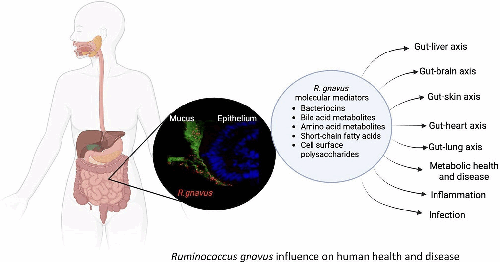
Full text loading...

Ruminococcus gnavus is a human gut symbiont, part of the infant and adult gut microbiota and associated with intestinal and extra-intestinal disorders. R. gnavus mechanisms of adaptation to the gut are strain-specific and underpinned by the capacity of R. gnavus strains to utilize mucin and dietary glycans and produce bacteriocins and adhesins. Several potential mediators underpinning the association between R. gnavus strains and diseases have been identified, including the capacity to elicit a pro- or anti-inflammatory host response and modulate host metabolism, secondary bile acids and tryptophan metabolic pathways. Based on increasing evidence from metagenomics studies in humans and functional investigations in vitro and in mouse models, R. gnavus is emerging as a main player in influencing health and disease outcomes from infants to the elderly.